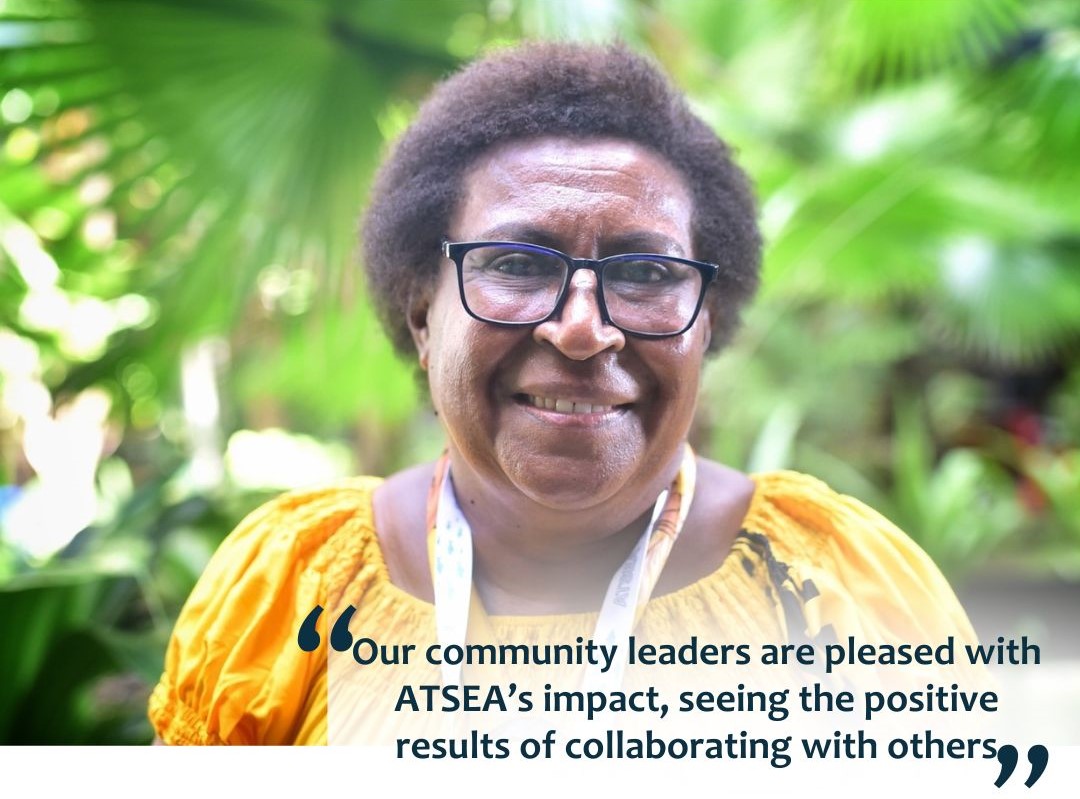Dainah Gigiba is the District Fisheries Officer for South Fly District in the Western Province of Papua New Guinea (PNG), where she has worked with the National Fisheries Authority (NFA) for the past 30 years. In her capacity as a delegate for the provincial government, she provides essential support to ATSEA-2 in our mission to improve compliance, while also building the capacity of local communities and helping them manage fisheries more sustainably.

Over the years, Dainah has seen many examples of unsustainable practices in Western Province, from overfishing and bycatch to Illegal, Unreported and Unregulated (IUU) fishing. In just one example, fishers tied their nets together to ensnare schools of jewfish in a narrow channel; this not only resulted in indiscriminate catch, but was extremely wasteful, as most fishers were only interested in harvesting the fish maw (swim bladder). As she recalls, “when they got what they wanted, they threw the carcasses away.”
She attributes these practices, and the resulting environmental impact, to a lack of community awareness. “We didn’t have the mechanism in place to assist our communities, to help them,” says Dainah, who also believes local people were often “overlooked” in the establishment and enforcement of laws, so were either unaware or chose not to comply with them.
Today, through a combination of outreach, education and capacity building, Dainah is working to address this issue, by providing an essential link between government, NGOs and local communities. Working together, these groups are better able to identify socio-economic and environmental problems in fishing communities, then empower the fishers themselves to participate in the creation and implementation of laws that can address such challenges.
“I see this as a very important area to help my people,” explains Dainah, who has overseen major improvements in public awareness and compliance with sustainable management. “ATSEA-2 has helped in a big way,” she says, reflecting on research and outreach efforts that have collected baseline data through surveys, completed transboundary analyses and regularly engaged in consultation with village communities.
A major aspect of this approach has been training and education. Together with ATSEA-2, Dainah and the NFA have provided Ecosystem Approach to Fisheries Management (EAFM) training for local fishers. “The training was very good, very beneficial for them,” says Dainah, who “saw them drawing up their own boundaries and laws.” She believes this emphasis on co-creation is critical to community buy-in and compliance. As she puts it, “because the training was centred to them, they actually got the message.”
The new regulations have already had an effect. In Sigabaduru Village, the community devised their own policies for the management of a known barramundi spawning area, banning the use of nets and opting instead for the use of lines to catch “only what you need.” Crucially, this regulation came from the community themselves – not as a directive from an outside organisation that would be unable to enforce it.
Through education and outreach, ATSEA-2 has helped to legitimise the concerns of local people, listening to them and empowering them to be the architects of positive impacts through community-led management. This in turn has engendered a positive, hopeful mindset; fishers are better informed and more motivated to become active in the ownership and management of their reefs and resources.
In addition to raising awareness, ATSEA-2 has also focused on connecting fishing communities with government; empowering them to co-create sustainable management solutions, then providing support for legislation that addresses their concerns. According to Dainah, by visiting these communities in person with the NFA, ATSEA-2 has helped to make positive impacts appear more tangible and attainable. “Our community leaders are pleased with ATSEA’s impact, seeing the positive results of collaborating with others”, says Dainah.
One of the positive impacts of this collaboration is that fishing communities in PNG are more excited about the future and determined to make a difference. As Dainah explains, “this is what they have been crying out for. They’re all eager for change – they can’t wait.”
By Chris Alexander


